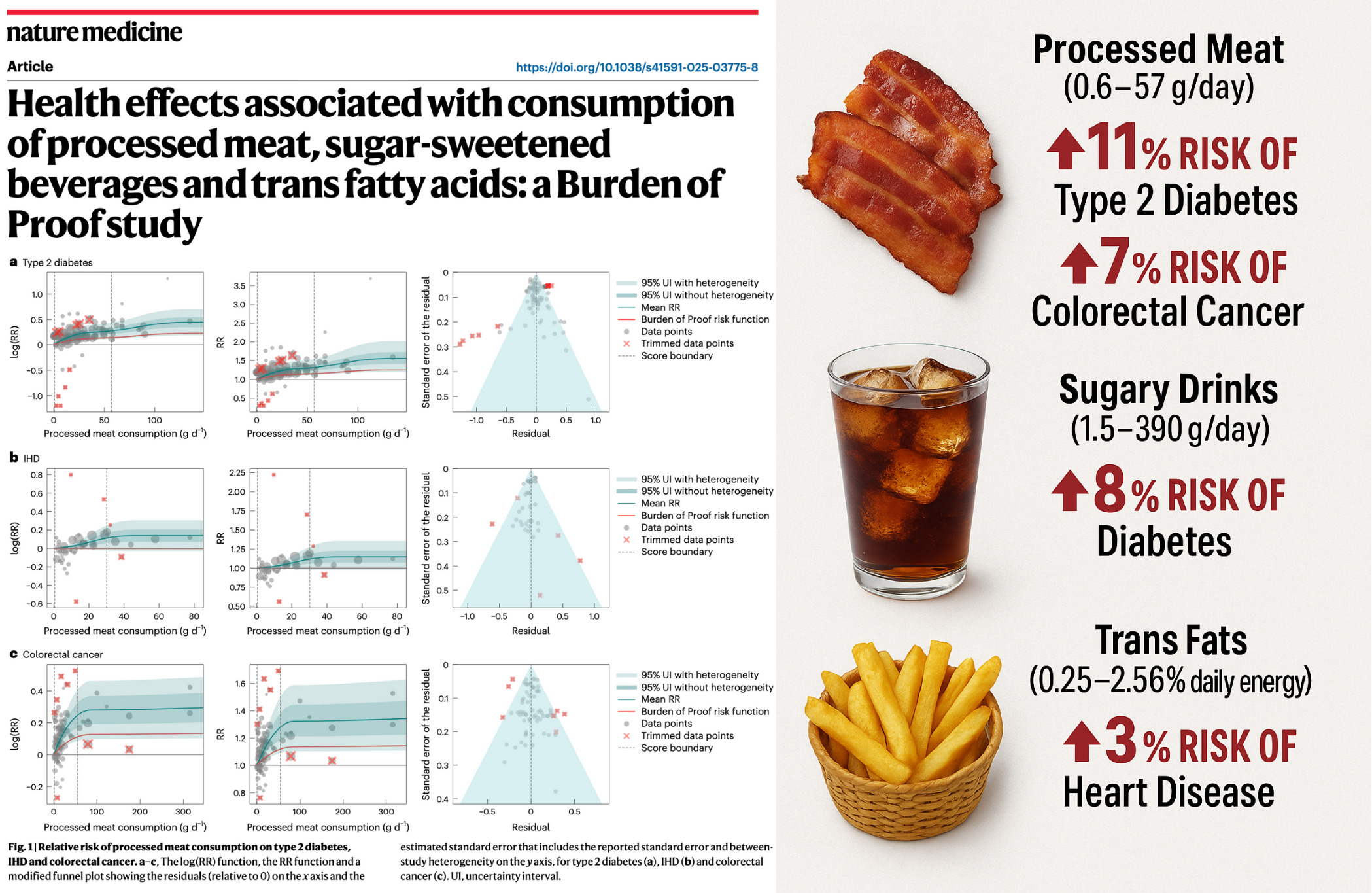NEW STUDY: Small Amounts of Processed Meat, Sugary Beverages, and Trans Fats Increase Risk of Cancer, Diabetes, and Heart Disease
Massive meta-analysis of millions finds even minimal daily intake drives chronic disease.
A major new study published in Nature Medicine examines how three common dietary components—processed meats, sugar-sweetened beverages (SSBs), and trans fatty acids (TFAs)—affect chronic disease risk. Drawing from hundreds of studies and millions of participants worldwide, researchers used a rigorous meta-analytic model known as the Burden of Proof (BoP) method to synthesize global data and estimate just how harmful these foods truly are:
Abstract
Previous research suggests detrimental health effects associated with consuming processed foods, including processed meats, sugar-sweetened beverages (SSBs) and trans fatty acids (TFAs). However, systematic characterization of the dose–response relationships between these foods and health outcomes is limited. Here, using Burden of Proof meta-regression methods, we evaluated the associations between processed meat, SSBs and TFAs and three chronic diseases: type 2 diabetes, ischemic heart disease (IHD) and colorectal cancer. We conservatively estimated that—relative to zero consumption—consuming processed meat (at 0.6–57 g d−1) was associated with at least an 11% average increase in type 2 diabetes risk and a 7% (at 0.78–55 g d−1) increase in colorectal cancer risk. SSB intake (at 1.5–390 g d−1) was associated with at least an 8% average increase in type 2 diabetes risk and a 2% (at 0–365 g d−1) increase in IHD risk. TFA consumption (at 0.25–2.56% of daily energy intake) was associated with at least a 3% average increase in IHD risk. These associations each received two-star ratings reflecting weak relationships or inconsistent input evidence, highlighting both the need for further research and—given the high burden of these chronic diseases—the merit of continuing to recommend limiting consumption of these foods.
Here are the key takeaways:
Processed Meat
Main Finding: Eating processed meat (e.g., bacon, hot dogs, deli slices with nitrates/nitrites) raises the risk of:
Type 2 diabetes by 11% on average
Colorectal cancer by 7%
Doses Studied: 0.6 to 57 grams per day
Interpretation: Even modest daily intake increases chronic disease risk. The more you eat, the worse the outcomes—but there’s no “safe” dose.
Sugar-Sweetened Beverages (SSBs)
Main Finding: Drinking sugary beverages like soda, energy drinks, or sweetened teas raises the risk of:
Type 2 diabetes by 8%
Ischemic heart disease (IHD) by 2%
Doses Studied: 1.5 to 390 grams per day (roughly 1 sip to over 3 cans/day)
Interpretation: These drinks deliver fast sugar spikes, fuel insulin resistance, and gradually damage cardiovascular health. Even small amounts carry measurable risk.
Trans Fatty Acids (TFAs)
Main Finding: Eating trans fats—often found in fried foods, baked goods, and margarine—raises the risk of ischemic heart disease by 3%
Doses Studied: 0.25% to 2.56% of daily energy intake
Interpretation: While bans have reduced global TFA exposure, this confirms even tiny amounts may still increase heart disease risk.
Strength of Evidence
All three food-disease links received a two-star rating under the BoP system. This means:
The evidence is statistically significant, but not very strong (due to inconsistent data or methodological limitations).
Findings warrant caution, but more research is needed to strengthen the conclusions.
In conclusion, processed meats, sugar-sweetened beverages, and trans fats are linked to increased risks of type 2 diabetes, colorectal cancer, and heart disease. Even moderate daily consumption may pose measurable harm. For better long-term health, stick to free-range unprocessed meats, natural beverages, and steer clear of fried or factory-made foods that quietly fuel chronic disease.
Epidemiologist and Foundation Administrator, McCullough Foundation
www.mcculloughfnd.org
Please consider following both the McCullough Foundation and my personal account on X (formerly Twitter) for further content.




A meta analysis is about as useful as a screen door on a submarine.
When you list bacon, do you mean the Soy/lab bacon substitute!? What about bacon from (local farms) from a small town butcher that has no nitrates or nitrates in it? Is fresh bacon like this harmful?....Thanks for clarifying this for me!